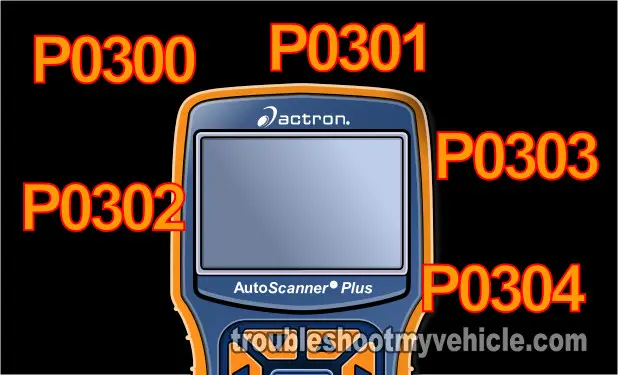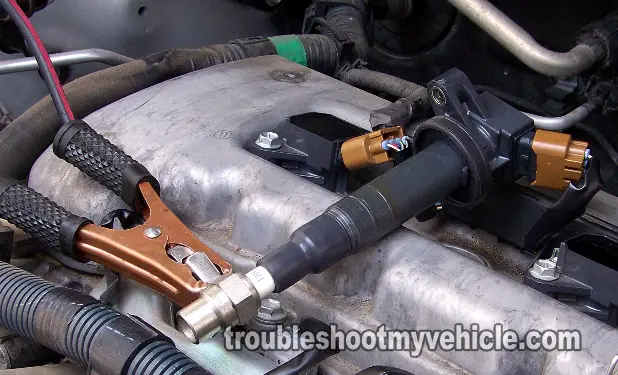TEST 1: Checking For Misfire Codes

What's gonna' help us nail down the ignition coil that's bad is to first identify the misfiring cylinder.
The fastest and easiest way to do this is to read any misfire codes stored in your Toyota's PCM memory.
If you don't have a scan tool, you can still find the ‘dead’ cylinder but you'll need to do a cylinder balance test. For more info on this, go to: TEST 4: How To Do A Cylinder Balance Test.
- 1
Connect your scan tool to your Toyota.
- 2
Turn the Key On Engine Off (KOEO).
Once your scan tool powers up, go to is READ TROUBLE CODES mode. - 3
What trouble codes are registered?
You may have more than one misfire trouble code so it's a good idea to write these down on a piece of paper.
Choose from one of the cases below:

CASE 1: You have a misfire code. The next step is to identify the misfire trouble code number with the correct engine cylinder using the illustration on the right.
- P0301: Cylinder #1 Misfire.
- P0302: Cylinder #2 Misfire.
- P0303: Cylinder #3 Misfire.
- P0304: Cylinder #4 Misfire.
Once you have identified the cylinder that's misfiring, the next step is to see if the COP coil is firing spark when you crank the engine. For this test, go to: TEST 2: Check The Ignition Coil For Spark.
CASE 2: You have a P0300 Misfire Code. This means that whatever is causing the misfire condition, is affecting all of the engine cylinders and not just one.
This code, the (P0300) usually rules out a bad COP ignition coil and/or a fuel injector as the culprit. Although it's beyond the scope of this article, I do have a few suggestions for you and these are to:
- Check to see if one or more engine cylinders have low engine compression.
- Check for vacuum leaks.
CASE 3: You DO NOT have any misfire codes. This usually means that the rough idle that your Toyota is experiencing is not being caused by a bad COP coil.
Now, the keyword here is ‘usually’ because your Toyota could have a bad COP coil. It's not uncommon for your vehicle to have a misfiring cylinder and yet the PCM doesn't register a misfire code.
The solution, is to do a manual cylinder balance test to find out which of all the 4 cylinders is misfiring (TEST 4: How To Do A Cylinder Balance Test).
Also, and preferably after you do the cylinder balance test, you need to do a thorough visual inspection of the spark plugs, COP coils to see if:
- Spark plugs are not:
- Soaked in oil (leaking valve cover gasket).
- Soaked in water (from power washing the engine).
- Cracked or broken.
- Center electrode's gap is filled/covered with carbon (from the cylinder burning oil).
- COP coils are not:
- Soaked in engine oil (leaking valve cover gasket).
- Soaked in water (from power washing the engine).
- Cracked or broken.
If all of the above checks out, I would suggest an engine compression test.
TEST 2: Check The Ignition Coil For Spark

Now that you know which cylinder is ‘dead’ (misfiring), from TEST 1 or TEST 4, the next step is to verify that the ignition coil, that belongs to the misfiring cylinder, is sparking.
This spark test needs to be done with a dedicated spark tester so that you can get an accurate spark test result.
IMPORTANT: You'll need to test for spark with the engine cranking. Be careful, stay alert, and use common sense.
OK, to get this pie baked, this is what you need to do:
- 1
Remove the ignition coil from its place on the valve cover.
NOTE: If you had to disconnect the ignition coil to remove it, reconnect it now. The ignition coil must be connected to its electrical connector for this test to work. - 2
Connect an HEI spark tester to the ignition coil.
NOTE: You can use any type of spark tester. The only reason I use and recommend the HEI spark tester is because this spark tester is accurate (and you don't have to worry about interpreting the color of the spark). - 3
Ground the HEI spark tester with a battery jump start cable directly on the battery negative (-) terminal.
- 4
Have a helper crank the engine while you observe the spark tester.
- 5
The spark tester will do one of two things: spark or NOT spark.
Repeat this test once more to make sure of your test result.
Let's see what your test results mean:
CASE 1: The COP ignition coil sparked. This spark test result tells you that the ignition coil you just tested is good (remember, the accuracy of this test depends on using a spark tester).
If a misfire code still accuses this cylinder as misfiring, it's important that you now check the following:
- Check to see if the valve cover gasket is leaking engine oil onto the spark plug and COP coil boot. If these are oil soaked, you've found the source of the misfire (you'll need to replace the valve cover gasket, the coil boot and the spark plug).
- Check to see if the spark plugs have carbon tracks on their porcelain insulator. To learn more about carbon tracks, the following tutorial will help:
- Carbon Tracks Are A Common Cause Of Ignition Misfires (at: easyautodiagnostics.com).
- Do an engine compression test to see if that cylinder has low engine compression. The following tutorial will help you test engine compression:
CASE 2: The ignition coil DID NOT spark. This spark test result usually indicates that the COP ignition coil is bad but not always. I suggest one more test to make sure.
The next step is to simply swap that ignition coil (that didn't spark) with the one next to it and then check both coils for spark. For this test and a better explanation of it, go to: Swap The ‘No Spark’ COP Coil.
